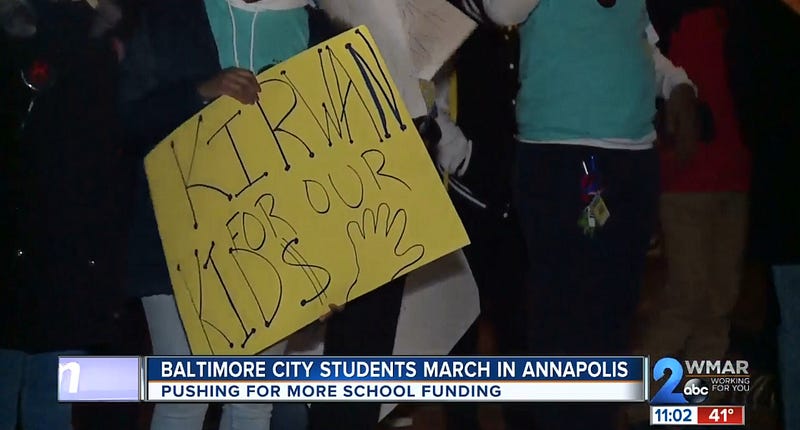The Push for Adequate and Equitable Funding Continues
And other legislative updates in this week’s Up the Street

THIS WEEK IN ANNAPOLIS
Students Rally to Pass the Blueprint for Maryland’s Future
About 200 students rallied on Monday in Annapolis in support of the Blueprint for Maryland’s Future. For these students and recent graduates, this legislation to enact the Kirwan Commission recommendations and create a new funding formula is essential. The Blueprint would hire more educators and increase diversity in staffing; expand wraparound services to reduce the impact of poverty; create smaller class sizes; improve educator pay, recruitment, and retention; target funding for students receiving special education services and English language learners; make pre-K affordable and accessible; and ramp up career technical education opportunities that will lead to well-paying jobs.
Students chanted their way to the State House so legislators would hear how important passing the Blueprint is to their future. Check out what they had to say for themselves in this coverage from WJZ.
National Study: Community Schools Improve Student Outcomes
A new report by the Rand Corporation about New York’s recent expansion of community schools painted a promising picture about the positive academic and disciplinary effects for students. The model would be replicated in schools across the Maryland with the adoption of a new funding formula that accounts for concentration of poverty and the hiring of community school coordinators. The coordinators conduct a school-specific needs assessment and work with government, non-profit, and other partners to tailor and administer services to the students and families in the school.
Expanding community schools has long been a priority for MSEA. MSEA President Cheryl Bost discussed the benefits of community schools on WBAL-TV and the opportunity before us to expand this proven reform with the passage of the Blueprint for Maryland’s Future.
NEWS AND NOTES
Overriding Vetoes — The Dream Act Expansion Passes (Again)
The House of Delegates and Senate both voted to override Governor Hogan’s 2019 veto of the expansion of the Dream Act (SB 537 and HB 262 from 2019). The veto override will now allow for the implementation of this pro-student legislation and permit Dreamers to attend a four-year university and pay in-state tuition rates without first having to attend community college. Both chambers also voted to override four other vetoes from last session, including Ban the Box legislation that controls when employers can ask about a job applicant’s criminal history (another MSEA priority from 2018 and 2019) and bills concerning gun safety, oyster management, and employment issues related to the State Labor Relations Board. Maryland Matters provided a comprehensive review of the overrides.
Identifying Revenue to Support a New Funding Formula
The Senate Budget and Taxation Committee had a full day of hearings on several revenue-related bills that would raise significant revenue to specifically support the Blueprint for Maryland’s Future Fund or the state’s general fund — both critical sources necessary to fund a new school finance formula and realize the benefits of the Kirwan Commission recommendations. The key bills discussed included Digital Advertising Gross Revenues (SB 2), Tobacco and Vaping Tax Increase (SB 3), Sports Betting (SB 4), and Closing Corporate Loopholes (SB 311 and SB 216), If all of these measures were enacted, the Department of Legislative Services projects they would raise $474 million in new revenue starting in FY21 and as much as $548 million in FY25. The committee indicated a number of these issues would be discussed in workgroups where significant amendments are expected that would ultimately change the projections outlined above.
Here We Go Again…And You Thought Groundhog Day Was Sunday

When it comes to education, Governor Hogan seems most focused on two things: 1. Raising dark money and straw man objections against the funding proposals to support the work of the Kirwan Commission and 2. Forcing all public schools in the state to start after Labor Day. In time and effort that could have been used to engage in a substantive way with the legislature’s work to enact the Blueprint for Maryland’s Future, instead the governor announced a new legislative proposal to remove local control and local input in the development of school calendars and require schools to start after Labor Day, effective the coming school year. MSEA, along with many other education advocates, will oppose this legislation and hopefully the legislature will dismiss it for the political stunt and attempted distraction that it is.
Kirwan Commission on the Air
In the latest episode of the MD Dems Podcast, MSEA President Cheryl Bost led a policy-focused and myth-busting conversation about the Blueprint for Maryland’s Future and the path to world-class schools throughout the state no matter a student’s zip code.
Search “MD Dems Podcast” on your favorite podcasting platform or visit www.mddems.org/podcast to listen.
CAMPAIGN 2020
Big Elections on Monday and Tuesday
While all eyes will be on Iowa on Monday night as Democrats fight to win the first contest in the presidential nomination battle, voters in Maryland’s 7th Congressional District will head to the polls on Tuesday to select the Democratic and Republican nominees in the special election to replace Congressman Elijah Cummings. The party nominees will face off in the special general election on Tuesday, April 28. The Baltimore Sun created a voter guide to help voters learn more about the 32 candidates competing for the nominations. For more information on the presidential contest, check out NEA’s Education Votes website for exclusive interviews and content with the 2020 contenders.
IT’S TIME FOR ACTION
Contact Your Legislators Today and throughout the Legislative Session
It’s been nearly 20 years since Maryland last updated how we fund our schools. In recent years, funding has become woefully inadequate and inequitable — and it shows:
· Half of educators are working second jobs to make ends meet.
· Every school in the state is annually underfunded by, on average, $2 million.
· Maryland spends 5% less on schools serving students in poverty.
The General Assembly can change that by revising Maryland’s school funding formula. And to demonstrate the broad-based support and ensure voices of educators and pro-public education allies are reflected in the final proposal, we must make our voices are heard.
Our kids can’t wait any longer for the funding and support that they deserve! Click here to email your legislators and urge them to pass a new funding formula that will be a game-changer for our students and schools.

